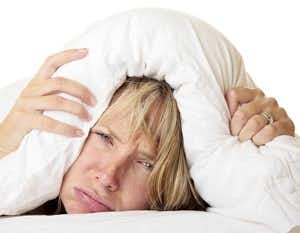
We hear from an extraordinary number of people who cannot get a good night’s sleep. Some have had long-term insomnia for no apparent reason. They just cannot fall asleep. They toss and turn for hours before their bodies finally allow them a few hours of shuteye.
Others fall asleep just fine, but wake up around 2:00 am either because they have to pee or just because. They then have a terrible time falling back asleep. It turns out that getting a good night’s sleep is hard for an awful lot of people.
What if Your Medicine is the Culprit?
A surprisingly frequent factor behind insomnia can be medicine. It has been our experience that health professionals rarely mention that a prescription can cause insomnia. It may seem to them like a relatively minor side effect, but poor sleep has become a public health nightmare. In our newly revised 16-page Guide to Getting a Good Night’s Sleep we describe the serious health risks associated with insomnia. When you see that forgetfulness, falls, high blood pressure, weight gain, diabetes and Alzheimer’s disease have been linked to insomnia you will appreciate the gravity of the situation.
Stories from Readers:
Greg shares his experience with the antibiotic Levaquin:
“The side effects I’m having seem to change weekly, left arm, right arm, knees, chills without fever, insomnia or maybe 4 hours of broken sleep etc. I was taking Levaquin for 10 days for pneumonia back in January and here it is March.”
Jim share his story about the pain reliever tramadol:
“I really thought I was becoming a whack job. I started with tramadol, only when needed, about four years ago. This was during and after a hip replacement, at 54. I have always been extremely active; outdoor activities, farming, dirt bikes, etc.
“About a year ago, I began to have periods of total malaise, despair, fatigue, and no interest in my own life. Nights became torture, RLS [restless leg syndrome] and insomnia. I’ve never been a good sleeper, but on this drug it became misery. Since I have never had any problems at all, with any meds, this was new territory for me.
“During this time my doctor, prescribed sertraline, to help with my inability to relax, which has been a lifelong problem. I am just an intense, active, type A personality. Now I realize sertraline and tramadol don’t really go together. I finally realized, from reading stories on this website, what was going on. I now, can relate my problems to a period of using tramadol.
“Last month, after a painful day, I used tramadol, as prescribed. It really didn’t do the job. But it, now I realize, turned my mental attitude upside down. I have had all the symptoms people on this website write about. The malaise, despair, and fatigue, were the worst. Thankfully, my dear wife, is a medical professional, with great knowledge of meds and illnesses.
“Today I am doing better, still tapering down on all meds. The lack of good sleep, was my biggest problem. I have an appointment with my doctor for next week, but have spoken to him on the phone during this transition. I still have some RLS, and crazy sleep patterns, but I have faith this will pass in time. Tapering is the only sensible alternative for this issue. The postings on this website are what got me on the right path.”
Amanda’s Cymbalta (duloxetine) withdrawal and severe insomnia:
“I accidentally stopped Cymbalta 5 days ago. I needed to go off other medications and forgot to take my Cymbalta a couple of days in a row because of it. I anticipated mood changes. To my surprise, my mood has been fine, but I am 4 NIGHTS IN A ROW WITH NO SLEEP. I’ve never had insomnia. Last night I literally never slept. I had tremors, vertigo and an extremely fast heart beat.
“After reading an article on this website I immediately took Cymbalta again. If I have to come off this drug I will do so very slowly, and only with help. I am grateful for the information on this website. I feel super dumb for stopping cold turkey. You may have saved my life tonight.”
The list of drugs that can cause disrupted sleep or insomnia is surprisingly long. It can include beta blocker heart medicine, prednisone or even over-the-counter cold remedies (containing decongestants). And stopping some medicines, including sleeping pills, can trigger terrible rebound insomnia.
We have included a list of drugs that may cause insomnia in our 16-page Guide to Getting a Good Night’s Sleep.
In this newly revised downloadable guide you will also find out about the latest information on sleeping pills (including the new highly advertised Belsomra) as well as non-drug options for falling asleep. Get the inside story on Ambien (zolpidem) and Lunesta (eszopiclone). Do some sleeping pills increase the risk for Alzheimer’s disease? Find out the latest about this controversy in our new Sleep Guide.
Do you have trouble falling asleep or staying asleep? Share your own secret to getting a good night’s sleep in the comment section below.

